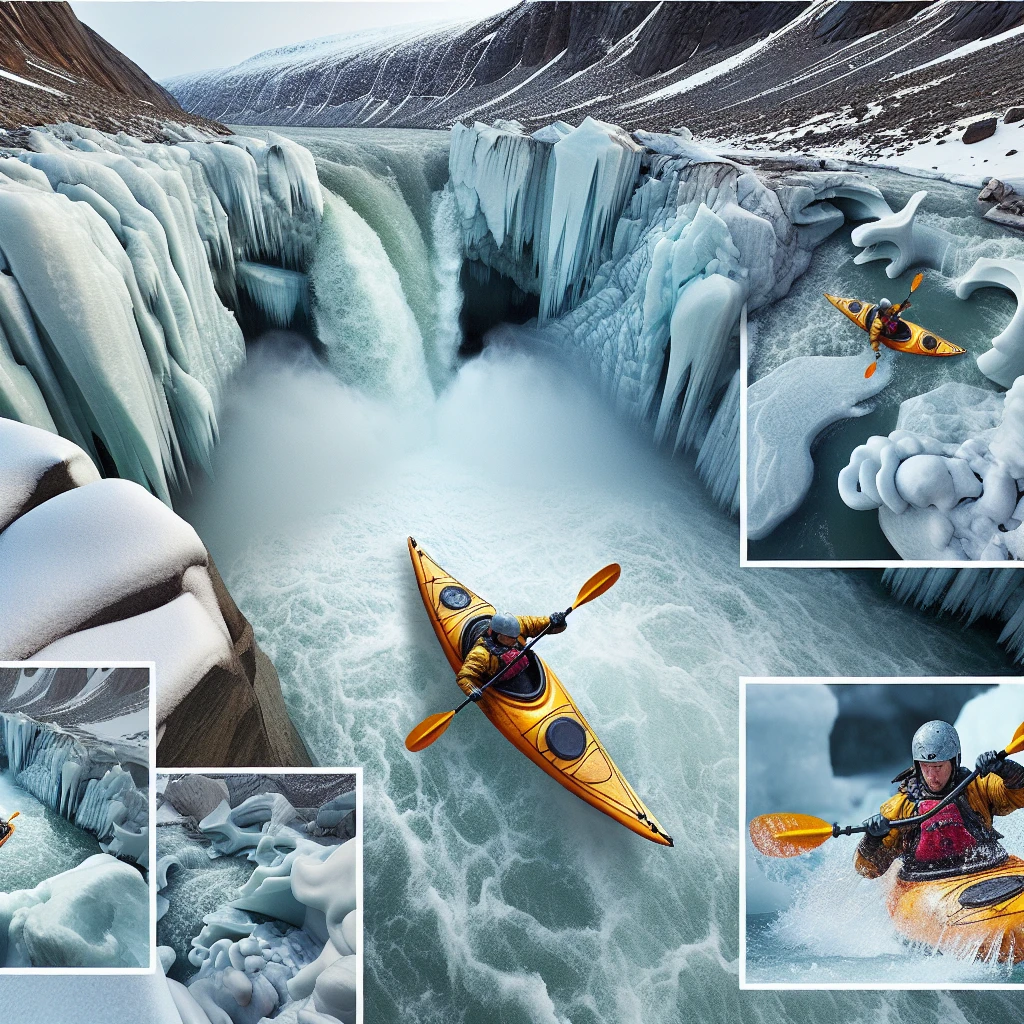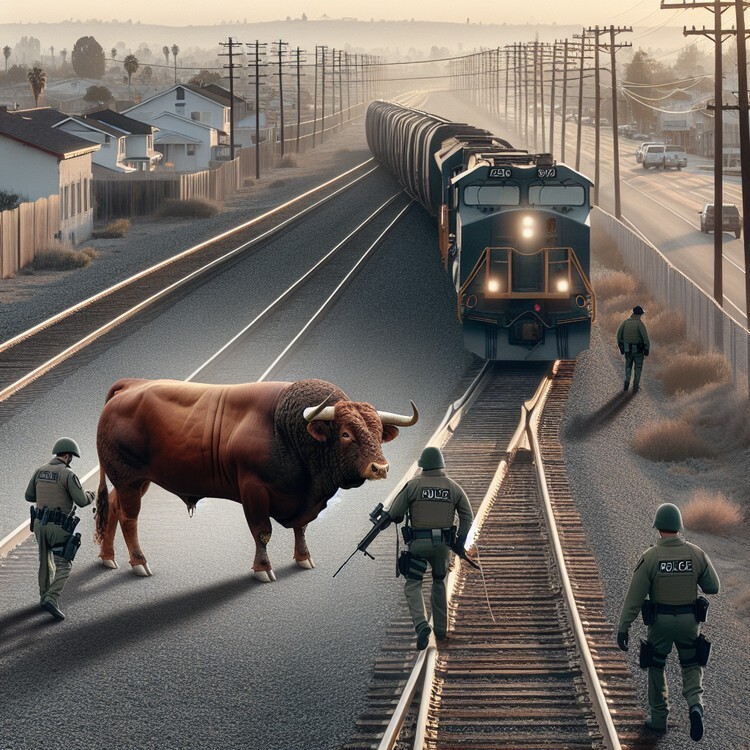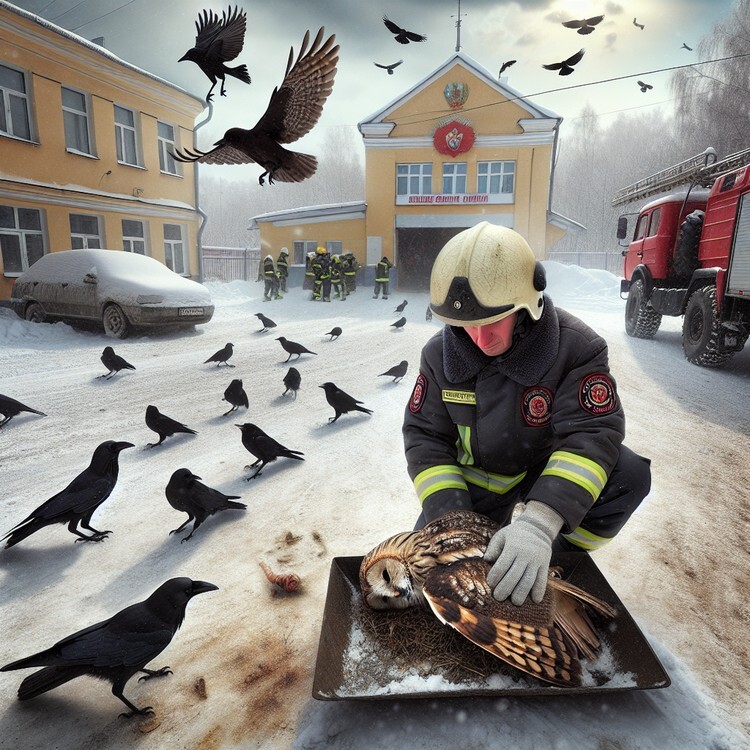A man from Catalonia, who is 32 years old, did something really amazing. He went down a 20-meter glacial waterfall in Svalbard, Norway. No one has ever done this before. Aniol Serrasolses went through the fast-moving water and tunnels of ice before tackling the ice waterfall. He said it felt like he was kayaking on a different planet.
The video of Serrasolses’ descent is really cool. It shows how beautiful and dangerous this extreme sport is. You can see how skilled and brave he is as he moves through the icy area. This shows that people love adventure and want to see what they can do.
Svalbard is in the Arctic Circle and is famous for its amazing landscapes and icy wilderness. The glacial waterfalls there are really hard to navigate and need a lot of skill. Serrasolses’ accomplishment shows how great he is, but also shows off the natural wonders of this faraway place.
This video is inspiring for other kayakers and people who love adventure. It shows that you can do anything if you work hard and respect nature. Serrasolses’ achievement will be remembered as a really cool thing in the world of kayaking.
Original news source: Kayaker’s 20m drop down ice waterfall in Svalbard, Norway (BBC)
Listen
Slow
Normal
Fast
Group or Classroom Activities
Warm-up Activities:
– News Summary
Instructions:
1. Divide the class into small groups.
2. Give each group a copy of the article.
3. Instruct the groups to read the article and summarize the main points in 5-10 sentences.
4. After they have finished, have each group share their summaries with the class.
– Opinion Poll
Instructions:
1. Divide the class into pairs.
2. Instruct each pair to discuss their opinions on extreme sports and adventures.
3. Provide a list of discussion questions related to the article, such as “Do you think extreme sports are worth the risk?” or “Would you ever try kayaking down a glacial waterfall?”
4. After the pairs have finished discussing, have a whole-class discussion where students share their opinions and reasons.
– Word Association
Instructions:
1. Write the words “adventure” and “nature” on the board.
2. Instruct the students to brainstorm as many words as they can that are related to these two words.
3. After a few minutes, have the students share their words with the class.
4. Encourage students to explain why they chose each word and how it is related to the article.
– Headline Creation
Instructions:
1. Instruct the students to work individually or in pairs.
2. Provide them with the main idea of the article and ask them to create a catchy headline for it.
3. After they have come up with their headlines, have each student or pair share their headline with the class.
4. Discuss as a class which headline they think is the most attention-grabbing and why.
– Future Predictions
Instructions:
1. Instruct the students to work in pairs or small groups.
2. Ask them to imagine what extreme sports or adventures might look like in the future.
3. Have them discuss and come up with at least three predictions.
4. After they have finished, have each group share their predictions with the class. Encourage them to explain their reasoning behind each prediction.
Comprehension Questions:
1. What did Aniol Serrasolses do that was really amazing?
2. Where did Aniol Serrasolses go to go down the glacial waterfall?
3. What did Aniol Serrasolses say it felt like when he was kayaking?
4. What does the video of Serrasolses’ descent show?
5. Why is Svalbard famous?
6. Why is navigating the glacial waterfalls in Svalbard difficult?
7. Who might find this video inspiring?
8. What does Serrasolses’ achievement show about working hard and respecting nature?
Go to answers ⇩
Listen and Fill in the Gaps:
A man from Catalonia, who is 32 years old, did something really amazing. He went down a 20-meter glacial (1)______ in Svalbard, (3)______. No one has ever done this before. Aniol Serrasolses went through the fast-moving (2)______ and tunnels of ice before (4)______ the ice waterfall. He said it felt like he was kayaking on a different (5)______.
The (6)______ of Serrasolses’ descent is really cool. It shows how beautiful and (7)______ this extreme sport is. You can see how skilled and (8)______ he is as he moves through the icy area. This shows that people love adventure and want to see what they can do.
Svalbard is in the (9)______ Circle and is famous for its amazing (10)______ and icy wilderness. The (11)______ waterfalls there are really hard to navigate and need a lot of skill. Serrasolses’ accomplishment shows how (12)______ he is, but also shows off the natural wonders of this (13)______ place.
This video is inspiring for other (14)______ and (15)______ who love adventure. It shows that you can do any(16)______ if you work hard and respect nature. Serrasolses’ achievement will be remembered as a really cool thing in the world of kayaking.
Go to answers ⇩
Discussion Questions:
Students can ask a partner these questions, or discuss them as a group.
1. What is a glacial waterfall?
2. How would you feel if you went down a 20-meter glacial waterfall?
3. Do you like extreme sports? Why or why not?
4. What do you think it takes to be skilled and brave in an extreme sport like kayaking?
5. Have you ever been to a place with amazing landscapes and icy wilderness? Where?
6. Do you think it’s important to respect nature? Why or why not?
7. What other extreme sports do you find inspiring? Why?
8. How do you think Serrasolses’ accomplishment will impact the world of kayaking?
9. Have you ever tried a sport that you thought was really cool? Which one?
10. What other natural wonders would you like to explore? Why?
11. How do you think Serrasolses’ achievement will inspire other kayakers?
12. Do you think it’s important to push yourself out of your comfort zone? Why or why not?
13. What other extreme sports do you think require a lot of skill?
14. How do you think Serrasolses’ descent compares to kayaking on a different planet?
15. Why do you think people love adventure and want to see what they can do?
Individual Activities
Vocabulary Meanings:
Match each word to its meaning.
Words:
1. Catalonia
2. descent
3. glacial
4. Svalbard
5. navigate
6. accomplishment
7. inspiring
8. kayaking
Meanings:
(a) Something that motivates or encourages
(b) To find a way through or travel on water
(c) The act of going down or descending
(d) A region in Spain with its own culture
(e) The sport of paddling a small boat on water
(f) An archipelago in the Arctic Ocean
(g) Related to ice or glaciers
(h) Something that is achieved or completed successfully
Go to answers ⇩
Multiple Choice Questions:
1. Where did Aniol Serrasolses go kayaking?
(a) Catalonia, Spain
(b) Arctic Circle
(c) Berlin, Germany
(d) Svalbard, Norway
2. How old is Aniol Serrasolses?
(a) 32 years old
(b) 20 years old
(c) 40 years old
(d) 25 years old
3. What did Aniol Serrasolses do that no one has ever done before?
(a) Went down a 20-meter glacial waterfall
(b) Climbed Mount Everest
(c) Swam with dolphins
(d) Explored the Amazon rainforest
4. Where is Svalbard located?
(a) In the Mediterranean Sea
(b) In the Arctic Circle
(c) In South America
(d) In Asia
5. What does the video of Serrasolses’ descent show?
(a) A different planet
(b) How to navigate glacial waterfalls
(c) The natural wonders of Catalonia
(d) The beauty and danger of the extreme sport
6. What does Serrasolses’ achievement inspire?
(a) People to disrespect nature
(b) People to stay indoors
(c) Other kayakers and adventure lovers
(d) People to give up on their dreams
7. What does the article say about the glacial waterfalls in Svalbard?
(a) They are easy to navigate and require no skill
(b) They are not dangerous at all
(c) They are hard to navigate and require skill
(d) They are located in Spain
8. How will Serrasolses’ achievement be remembered?
(a) As a boring and unimportant event
(b) As a really cool thing in the world of kayaking
(c) As a dangerous and foolish act
(d) As a failure
Go to answers ⇩
True or False Questions:
1. The man navigated through fast-moving water and tunnels of ice before tackling the ice waterfall.
2. He described the experience as kayaking on the same planet.
3. The video of his descent showcases the beauty and danger of this extreme sport.
4. This feat has never been accomplished before.
5. This achievement serves as an inspiration for other kayakers and adventure enthusiasts, neglecting the importance of hard work and respect for nature.
6. It demonstrates the lack of skill and bravery of the man as he maneuvers through the icy terrain.
7. Svalbard, located in the Arctic Circle, is known for its stunning landscapes and icy wilderness.
8. A man from Catalonia failed to descend a 20-meter glacial waterfall in Norway.
Go to answers ⇩
Write a Summary:
Write a summary of this news article in two sentences.
Check your writing now with the best free AI for English writing!
Writing Questions:
Answer the following questions. Write as much as you can for each answer.
Check your answers with our free English writing assistant!
1. What did the man from Catalonia do that was really amazing?
2. How did Aniol Serrasolses describe the feeling of going down the glacial waterfall?
3. What does the video of Serrasolses’ descent show?
4. Where is Svalbard located and what is it famous for?
5. What does Serrasolses’ achievement inspire other kayakers and adventure lovers to do?
Answers
Comprehension Question Answers:
1. What did Aniol Serrasolses do that was really amazing?
Aniol Serrasolses went down a 20-meter glacial waterfall in Svalbard, Norway, which no one had ever done before.
2. Where did Aniol Serrasolses go to go down the glacial waterfall?
Aniol Serrasolses went to Svalbard, Norway to go down the glacial waterfall.
3. What did Aniol Serrasolses say it felt like when he was kayaking?
Aniol Serrasolses said it felt like he was kayaking on a different planet.
4. What does the video of Serrasolses’ descent show?
The video shows the beautiful and dangerous nature of the extreme sport, as well as Serrasolses’ skill and bravery.
5. Why is Svalbard famous?
Svalbard is famous for its amazing landscapes and icy wilderness.
6. Why is navigating the glacial waterfalls in Svalbard difficult?
Navigating the glacial waterfalls in Svalbard is difficult because they are hard to navigate and require a lot of skill.
7. Who might find this video inspiring?
Kayakers and people who love adventure might find this video inspiring.
8. What does Serrasolses’ achievement show about working hard and respecting nature?
Serrasolses’ achievement shows that if you work hard and respect nature, you can accomplish anything.
Go back to questions ⇧
Listen and Fill in the Gaps Answers:
(1) waterfall
(2) water
(3) Norway
(4) tackling
(5) planet
(6) video
(7) dangerous
(8) brave
(9) Arctic
(10) landscapes
(11) glacial
(12) great
(13) faraway
(14) kayakers
(15) people
(16) thing
Go back to questions ⇧
Vocabulary Meanings Answers:
1. Catalonia
Answer: (d) A region in Spain with its own culture
2. descent
Answer: (c) The act of going down or descending
3. glacial
Answer: (g) Related to ice or glaciers
4. Svalbard
Answer: (f) An archipelago in the Arctic Ocean
5. navigate
Answer: (b) To find a way through or travel on water
6. accomplishment
Answer: (h) Something that is achieved or completed successfully
7. inspiring
Answer: (a) Something that motivates or encourages
8. kayaking
Answer: (e) The sport of paddling a small boat on water
Go back to questions ⇧
Multiple Choice Answers:
1. Where did Aniol Serrasolses go kayaking?
Answer: (d) Svalbard, Norway
2. How old is Aniol Serrasolses?
Answer: (a) 32 years old
3. What did Aniol Serrasolses do that no one has ever done before?
Answer: (a) Went down a 20-meter glacial waterfall
4. Where is Svalbard located?
Answer: (b) In the Arctic Circle
5. What does the video of Serrasolses’ descent show?
Answer: (d) The beauty and danger of the extreme sport
6. What does Serrasolses’ achievement inspire?
Answer: (c) Other kayakers and adventure lovers
7. What does the article say about the glacial waterfalls in Svalbard?
Answer: (c) They are hard to navigate and require skill
8. How will Serrasolses’ achievement be remembered?
Answer: (b) As a really cool thing in the world of kayaking
Go back to questions ⇧
True or False Answers:
1. The man navigated through fast-moving water and tunnels of ice before tackling the ice waterfall. (Answer: True)
2. He described the experience as kayaking on the same planet. (Answer: False)
3. The video of his descent showcases the beauty and danger of this extreme sport. (Answer: True)
4. This feat has never been accomplished before. (Answer: True)
5. This achievement serves as an inspiration for other kayakers and adventure enthusiasts, neglecting the importance of hard work and respect for nature. (Answer: False)
6. It demonstrates the lack of skill and bravery of the man as he maneuvers through the icy terrain. (Answer: False)
7. Svalbard, located in the Arctic Circle, is known for its stunning landscapes and icy wilderness. (Answer: True)
8. A man from Catalonia failed to descend a 20-meter glacial waterfall in Norway. (Answer: False)
Go back to questions ⇧















